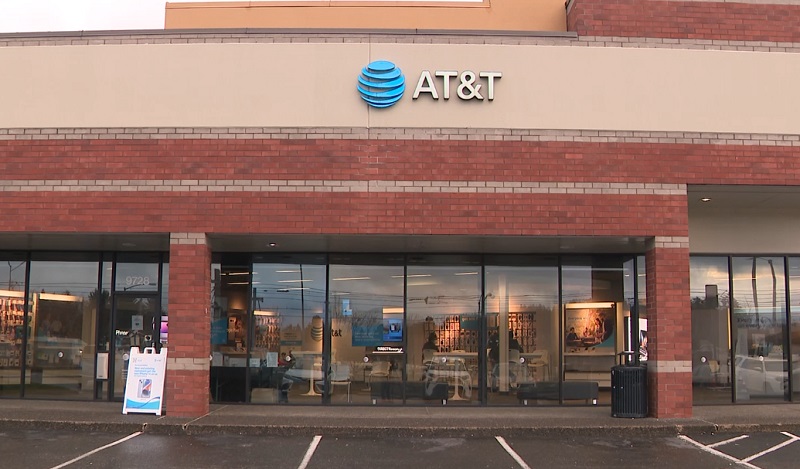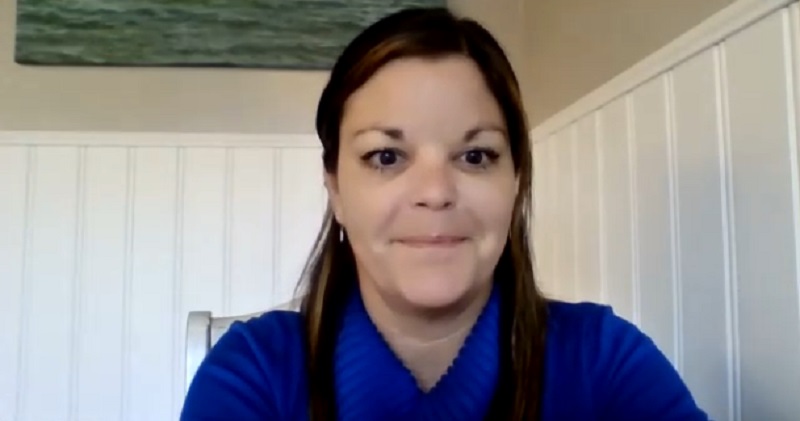PORTLAND, Ore. (KOIN) — Lisa McIntyre lives in San Diego, California. One recent morning her phone randomly stopped working. What began as a brief inconvenience quickly turned into her worst nightmare.
When she got home from running errands, she began Googling ‘how to fix her phone’ that was showing an SOS message. What McIntyre didn’t know at the time is that a woman was in Portland, Oregon impersonating her at the AT&T store near Mall 205. The imposter was getting a new phone in McIntyre’s name and disconnecting McIntyre’s real phone.

“My phone was off for a total of 3 hours,” she told KOIN 6 News. But within that short window, serious damage was done.
“I went on Wi-Fi here at my own house and I went to check my email and I saw from Chase Bank, it said, ‘Your wire transfer went through,'” she said. “I was like, what?!”
The Portland imposter stole $48,000 from her and her husband’s Chase Bank account. Her husband checked his email and saw a message from AT&T.
“He had an email that said, ‘Your products have been picked up,'” she said.
Confused by both emails, they hadn’t yet put all the pieces together of what was happening, but they hurried to their local bank branch to try and stop the bleeding.
“I rushed to Chase Bank,” McIntyre told KOIN 6 News. “They were very nonchalant about it. It took forever to even sit down with someone. It was probably 30 minutes before I could sit down with someone where he was on the computer looking up my wire transfer.”

AT&T investigated and within a day “confirmed that the wireless number” was added to Lisa’s account “without [their] knowledge.” The phone company immediately canceled the unauthorized service and refunded McIntyre for the iPhone and iPad purchased on their account.
Meanwhile, Chase Bank employees directed her to file a fraud claim. But soon after, Chase Bank sent her a letter: “We’re denying your claim because we determined the items were authorized or you benefitted from the item. We will not reimburse your account.”
McIntyre said she felt helpless.
“My information was, I believe, taken from a data breach. That’s out of my control. I had nothing to do with it,” she said. “It wasn’t even my fault.”
But she and her husband wondered how they were going to get their money back?
‘Googled Chase wire fraud, found an article’
McIntyre said the night it happened, her husband was up “and freaking out. He Googled ‘Chase wire fraud’ and had found an article.”
Those KOIN 6 News articles documented how others, collectively, had about $100,000 fraudulently taken through Chase Bank wire transfers — and how KOIN 6 News helped get them their money back.
McIntyre said they watched the videos attached to the stories. “So he’s, like, ‘You gotta contact her.’ And I was, like, ‘Really?’ And he’s, like, ‘Yes!'”

KOIN 6 News gathered the paper trail connected to their situation after being contacted by the McIntyres.
KOIN 6 News showed executives at Chase Bank the written confirmation from AT&T — that someone committed fraud in their store in Portland around 11:30 a.m. on the day in question.
There was also records showing a brand new iPhone was set up in Lisa’s Chase Bank app hours before the wire transfer went through.
At that same time, Chase Bank should have a record of Lisa McIntyre being in the San Diego bank branch before 2 p.m. that day.
That timeframe showed one thing very clearly: It was not physically possible for Lisa McIntyre to be in those 2 places to authorize the wire transfer.
Soon after Chase Bank received this information from KOIN 6 News, bank officials said they would reimburse McIntyre’s $48,000.
“I mean, literally hours later I got that phone call. They’re like, ‘This is Chase executive branch,” McIntyre said, beaming with delight.
At a time when she felt so lost, Lisa McIntyre said she’s grateful journalism could help change the course of her life — and get her money where it belongs, in her account.
Epilogue
Lisa McIntyre believes the criminals got access to her private information in a data breach at the school district where she works. The district attorney in San Diego is investigating the incident but said they can’t comment further on ongoing cases.
Chase Bank declined to comment further. However, they did confirm the wire transfer was initiated on their mobile app. McIntyre said Chase employees told her they texted her that day asking about the wire transfer, and received a text reply, “Yes, proceed.”
Everyone now acknowledges that reply came from the thieves.
Other professionals in the financial industry told KOIN 6 News it’s best for financial institutions to verbally confirm intent and instructions for a wire transfer with the customer. They also suggest adding a trusted contact — like a parent or a partner — who a bank can call to verify if something like a $48,000 wire transfer across the country sounds like something their customer would do.
Detectives also suggest people use bitwarden—an encrypted password program as an added layer to protect your personal accounts.